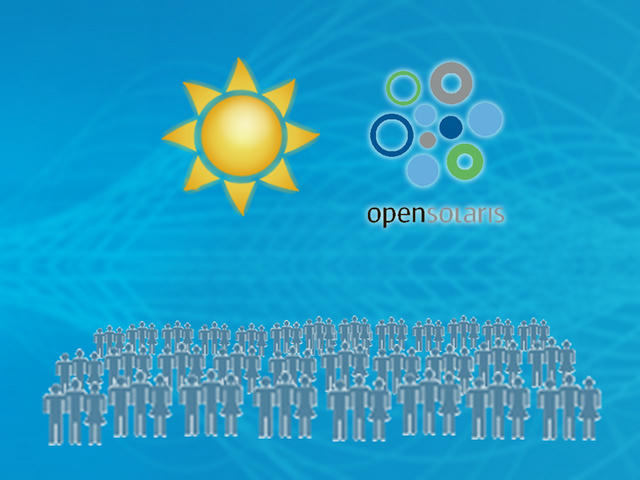This post is obsolete
This blog post is quite old, and a lot has changed since then. Meanwhile, I have changed employer, blogging platform, software stack, infrastructure, interests, and more.
You will probably find more recent and relevant information about the topics discussed here elsewhere.
Still, this content is provided here for historical reasons, but please don’t expect it to be current or authoritative at this point.
Thanks for stopping by!
What Communities Should Do (And What They Shouldn't)

Ever since Oracle announced that they’ll buy Sun (no link, page no longer exists), there has been a lot of discussion about the future (some would say “fate”) of OpenSolaris in the “community”.
In fact, the last 15 months have been very instructive in terms of how communities work, or how they don’t.
Let’s check out what a community is supposed to do, and what it is not supposed to do, in the light of the latest OpenSolaris announcement: Illumos.
Things That a Community Should Not Do
The OpenSolaris community has gone through a very instructive period over the last half a year or so, triggered by the completion of the Sun acquisition (no link, page no longer exists) and, perhaps more prominently, by the absence of the much anticipated OpenSolaris 2010/01 05 H1.
Tons of emails flooded the mailinglists, expecting, wondering, complaining, demanding the long promised update to the OpenSolaris distribution, but no distribution came.
Lesson #1: A community is not a waiting list.
Of course, most members of the community are users of the OpenSolaris distribution, but that doesn’t mean that the community should be just waiting for the next release. A community must be more than that.
Then came a colorful mixture of feelings: Anger, frustration, denial, worry, hate. Mostly against Oracle, the new owner of the Solaris project, but occasionally against the few community members that tried to calm people down, reminding fans, critics and trolls to be mindful and to try and be more productive.
Lesson #2: A company is a company and a community is a community.
Meaning: The OpenSolaris community should accept the responsibility for themselves, for their own actions and inactions, for what they start and for what they achieve. Sun (now Oracle) was generous enough to offer the community insight and participation into the best operating system in the world, but let’s not forget that the Solaris project is still driven by a real company.
Ben Rockwood, as always, offered a spot-on analysis about understanding OpenSolaris and its governance.
Still, some people did not get it and in a desperate attempt to get some attention, they threatened to shoot themselves in the head (another must read article from Ben), which, IMHO, is not a good move if you want to grow a community, or make it more useful.
Lesson #3: A community should act as an independent entity.
Independence is a key point of a healthy community. The OpenSolaris community will never go anywhere if it continues to crave attention from Oracle, because that’s neither the point of a community, nor a very productive thing to do in general.
Actually, Oracle itself wants its communities to be more independent, which is exactly why they asked that OpenSolaris user groups be led by non-Oracle people (no link, opensolaris.org no longer exists). A much misunderstood communication, but really a wise and empowering move, because only a truly independent community can do the right thing, always and without having to ask for permission.
Which brings us to the best OpenSolaris related announcement in months:
Things That a Community Should Do
Today, Garret D’Amore and his team announced their new project: Illumos.
The goal of the Illumos project is to make the Solaris Operating System and Networking core (ON) truly independent, by replacing the few remaining closed-source pieces with new, open source ones. This means the full emancipation of the OpenSolaris community, the final step to total independence.
It is not a fork (because it closely follows the original ON source) and it is not a distribution (because it doesn’t come with all the bits beyond ON to make it useful). But it is an important step for the OpenSolaris community to claim responsibility for itself and for becoming more independent.
Kudos to Garret and the Illumos team, and I hope that it becomes the centerpoint for numerous other responsible, independent and productive OpenSolaris related projects to come!
Read some early insights and analysis into Illumos by Bryan Cantrill (on the power to fork) and Simon Phipps (on its role in the OpenSolaris community) now.
And of course, start reading Garret’s Blog (which now will quickly climb up from spot #10 in my recent OpenSolaris blog top ten list) and join the Illumos project!
P.S.: Illumos is of course not the only gem in the OpenSolaris community. There’s of course the numerous OpenSolaris User Groups (no link, opensolaris.org no longer exists), the recently held OpenSolaris Hackathon, numerous bloggers, code contributors, distro leaders etc. I hope to see more of all of the above, ’cause that’s what real communities do.
